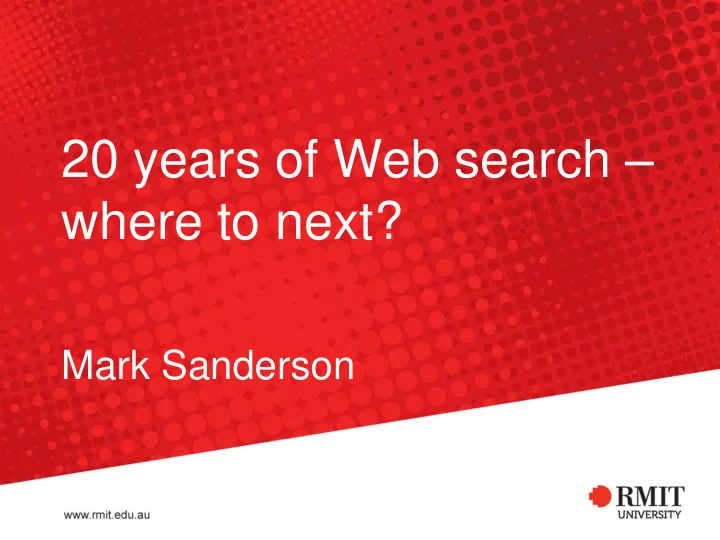

20 years of Web search – where to next? Mark Sanderson
Who am I? • Professor at RMIT University, Melbourne • Before – Professor at University of Sheffield – Researcher at UMass Amherst – Researcher at University of Glasgow • Online – @IR_oldie – http://www.seg.rmit.edu.au/mark/ 2
Overview of talk • A bit of history
A bit of history Early IR
Before IR systems • There were libraries – The search engine of the day • Organise information using a subject catalogue – Sort cards by author – Sort cards by title – Sort cards by subject – How to do this? 5
Not just public libraries • MIT Masters thesis, Philip Bagley, 1951 6
At the same time… • While librarians were coping with the information explosion – Could machines help? – Could computers help? • Very brief history of machines and computers for search 7
Machines doing IR CS&IT - ISAR 8
As we may think – Bush 1945 – http://www.youtube.com/watch?v=c539cK58ees 9
Computers doing IR • Holmstrom 1948 10
Information Retrieval • Calvin Mooers, 1950 11
NRT • See demo shown in talk at – http://www.seg.rmit.edu.au/mark/demos/NRT/NRT%20demo.htm • Paper at – http://www.seg.rmit.edu.au/mark/cv/publications/papers/my_papers/EP-odd.pdf 12
The web arrived • 1993 – JumpStation – Jonathon Fletcher, University of Stirling • Steinberg, Wired, 1996 –“ Information retrieval is really only a problem for people in library science - if some computer scientists were to put their heads together, they'd probably have it solved before lunchtime. ”
Where are we now Google/Bing
Where we are now • Google/Bing – Text matching – Fields, anchor – PageRank – Query logs –… – Massive machine learning – Evaluation – Continual tuning
Search is solved? • Common perception 16
Favourable conditions • Most content wants to be found • Most content is redundant • Huge income • Queries often repeated • Users can read & write 17
Where to next? • Immediate problems • Immediate opportunities • Medium term challenges • Longer term challenges
Immediate Problems/opportunies
Problematic summaries 20
Less favourable? • People struggle to search • People miss retrieved documents – Fine for redundant content; what if just one? 21
Problem searching • Limited redundancy – Little money – Enterprise search – Refinding –Content doesn’t want to be found – Patent search – Legal document search (e-Discovery) 22
Enterprise search • Many problems in this space • Each collection is different – Each search engine needs to be different • No money •“Why doesn’t it work like Google?” 23
Significant problem • Think carefully before including search in your user interface 24
At RMIT • Trying to scope the problem – If we find a search solution that works on one set of documents, does it work on others? – Not as much as was thought – A lot worse than was thought 25
Major immediate challenge • Do search as well as Google no matter what the collection, and do it without all their money 26
Favourable conditions • Most content wants to be found • Most content is redundant • Huge income • Queries often repeated • Users can read & write 27
Refinding • Interviewed 45 searchers about common retrieval tasks – 70% relate to refinding • Starting funded investigation in this area. 28
Ephemeral & archival content • Archival – Traditional web search – Web pages, news, documents – Coarse grained • Ephemeral – Social media – Blogs, social networks, micro-blogs – Fine grained 29
Interface of the two • Summarising ephemeral content – Only just starting – Lots of opportunities to specialise • How can ephemeral content aid search of archival – RMIT changing representation of archival content based on ephemeral data. – Early days, but promising 30
Medium term
Diffuse information
Harder information needs • Entertain me • Contextual search • SWIRL 2012 – http://www.cs.r mit.edu.au/swirl 12/ 33
Longer term
Longer term • Long queries • Spoken search • The internet for everyone
Users have complex needs • Poorly expressed in short queries – Experts – issue multiple short queries – use search engine operators • Can we build search engines to handle complex queries? 36
New application area? • Speech search – Hand free – Eyes free • Seen in the movies, but really? 37
Users? • Visually impaired – Together they could form a country • Other potential uses – In car searching – Walking in a city 38
Internet for everyone – http://www.onbile.com/info/how-many-people-use-smartphones-in-the-world/ 39
Internet users? • 2013 – 2 billion now • 2015 – 4 billion mostly on mobiles (Baird Equity Research) 40
Implications? • More languages • More users who struggle with literacy – Search engines assume you can read and write 41
Search engines There is a lot still to do
Recommend
More recommend